December 3, 2014 •
Oakland Council Set to Vote on New Ethics Rules
City Council is preparing to hold a final vote on the Oakland Government Ethics Act after voters overwhelmingly approved a measure to strengthen the city’s Public Ethics Commission (PEC). Measure CC, a charter amendment, gives the PEC authority to enforce […]
 City Council is preparing to hold a final vote on the Oakland Government Ethics Act after voters overwhelmingly approved a measure to strengthen the city’s Public Ethics Commission (PEC). Measure CC, a charter amendment, gives the PEC authority to enforce the city’s lobbying laws and to levy fines in excess of $1,000 for violations.
City Council is preparing to hold a final vote on the Oakland Government Ethics Act after voters overwhelmingly approved a measure to strengthen the city’s Public Ethics Commission (PEC). Measure CC, a charter amendment, gives the PEC authority to enforce the city’s lobbying laws and to levy fines in excess of $1,000 for violations.
The Oakland Government Ethics Act compliments the charter amendment by providing a new set of ethics rules including a revolving-door provision and a new lower annual gift limit of $250. Gifts from persons who do business or seek to do business with the city would further be limited to $50 annually.
The council is scheduled to hold a final vote on the legislation on December 9, 2014.
November 18, 2014 •
Virginia Ethics Panel Readies Recommendations for Governor
The ethics panel recently assembled by Gov. Terry McAuliffe has assembled its recommendations for reforming laws covering gifts and conflicts of interest. The panel recommended a $250 gift limit to public officials as well as creating a new ethics review […]
 The ethics panel recently assembled by Gov. Terry McAuliffe has assembled its recommendations for reforming laws covering gifts and conflicts of interest. The panel recommended a $250 gift limit to public officials as well as creating a new ethics review commission with the power to investigate complaints and hand out penalties for violations.
The ethics panel recently assembled by Gov. Terry McAuliffe has assembled its recommendations for reforming laws covering gifts and conflicts of interest. The panel recommended a $250 gift limit to public officials as well as creating a new ethics review commission with the power to investigate complaints and hand out penalties for violations.
Other recommendations include requiring electronic filing of disclosure forms and prohibiting board and commission members from voting on matters affecting their interests.
The panel will formally submit its recommendations to the governor on December 1.
November 17, 2014 •
Pennsylvania Governor-Elect Wolf Bans Gifts to Transition Team
Gov.-elect Tom Wolf, fresh off of a victorious first campaign for public office, is already taking steps to ensure the ethical conduct of his administration. Wolf is requiring members of his transition team to sign a code of conduct including […]
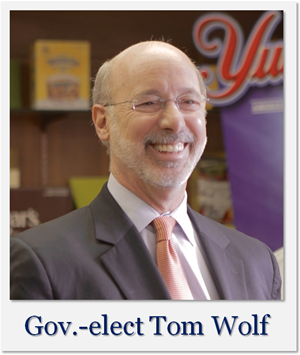 Gov.-elect Tom Wolf, fresh off of a victorious first campaign for public office, is already taking steps to ensure the ethical conduct of his administration.
Gov.-elect Tom Wolf, fresh off of a victorious first campaign for public office, is already taking steps to ensure the ethical conduct of his administration.
Wolf is requiring members of his transition team to sign a code of conduct including a ban on accepting gifts, one he plans to extend to the entire executive branch upon taking office.
The pledge also includes a requirement to disclose current and future conflicts of interest and a promise to not use their position for personal gain.
Photo of Gov.-elect Tom Wolf by Bruestle2 on Wikimedia Commons.
October 14, 2014 •
California FPPC Announces Proposed Amendments
The Fair Political Practices Commission (FPPC) has given notice of proposed amendments to regulations in Title 2, Division 6 of the California Code of Regulations. The FPPC will make adjustments to the gift and campaign contribution limits to reflect changes […]
 The Fair Political Practices Commission (FPPC) has given notice of proposed amendments to regulations in Title 2, Division 6 of the California Code of Regulations. The FPPC will make adjustments to the gift and campaign contribution limits to reflect changes in the consumer price index.
The Fair Political Practices Commission (FPPC) has given notice of proposed amendments to regulations in Title 2, Division 6 of the California Code of Regulations. The FPPC will make adjustments to the gift and campaign contribution limits to reflect changes in the consumer price index.
In order to provide the adjustment in time for the new calendar year, the November index is used to make the final calculation. The proposed amendments make adjustments for the period from January 1, 2015, through December 31, 2016.
The FPPC will consider the proposed regulations at a public hearing on or after November 20, 2014. The proposed amendments are available here.
October 13, 2014 •
Arkansas Ethics Ballot Measure Offers Tradeoff
A proposed constitutional amendment on the November 4, 2014, ballot will determine whether voters are willing to extend term limits for state lawmakers in exchange for strict ethics laws for lobbyists and corporations. Issue 3 will ban corporate and union […]
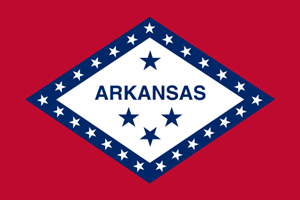 A proposed constitutional amendment on the November 4, 2014, ballot will determine whether voters are willing to extend term limits for state lawmakers in exchange for strict ethics laws for lobbyists and corporations. Issue 3 will ban corporate and union gifts to political campaigns, ban lobbyist gifts to legislative and executive officials, and extend term limits for legislators to at least 16 years.
A proposed constitutional amendment on the November 4, 2014, ballot will determine whether voters are willing to extend term limits for state lawmakers in exchange for strict ethics laws for lobbyists and corporations. Issue 3 will ban corporate and union gifts to political campaigns, ban lobbyist gifts to legislative and executive officials, and extend term limits for legislators to at least 16 years.
Under the current state constitution, lawmakers typically serve no more than six years in the House and eight years in the Senate. The ballot measure would allow lawmakers to serve 16 years in the same office, or even longer for senators winning special two-year terms after each decennial census and redistricting process.
Adding term limits to the bill helped the ethics package pass the Legislature, but has decreased the popularity of the ballot measure in pre-election polls.
September 9, 2014 •
Georgia Commission Prepares to Amend Rules
The state ethics commission is preparing to amend rules regarding campaign finance and lobbyist reporting. The campaign finance changes include allowing the commission to raise or lower campaign contribution limits at the end of four-year election cycles rather than every […]
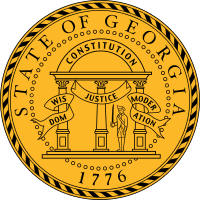 The state ethics commission is preparing to amend rules regarding campaign finance and lobbyist reporting. The campaign finance changes include allowing the commission to raise or lower campaign contribution limits at the end of four-year election cycles rather than every calendar year. The rules would also clarify only contributions to candidates can trigger the $25,000 annual registration and reporting threshold for individuals or entities making contributions.
The state ethics commission is preparing to amend rules regarding campaign finance and lobbyist reporting. The campaign finance changes include allowing the commission to raise or lower campaign contribution limits at the end of four-year election cycles rather than every calendar year. The rules would also clarify only contributions to candidates can trigger the $25,000 annual registration and reporting threshold for individuals or entities making contributions.
Lobbying amendments would require reporting for gifts to family of officials and permit gift splitting by multiple lobbyists so long as a single lobbyist does not exceed the $75 limits.
A public hearing on the proposed changes is scheduled for September 30, 2014.
August 20, 2014 •
WA Ethics Board Votes to Allow Legislators 12 Free Meals Per Year
The Washington Legislative Ethics Board has come to a preliminary conclusion as to how to define “infrequent occasions” as it relates to free meals accepted by the state’s legislators. Section 42.52.420 of the Revised Code of Washington allows public officials […]
 The Washington Legislative Ethics Board has come to a preliminary conclusion as to how to define “infrequent occasions” as it relates to free meals accepted by the state’s legislators. Section 42.52.420 of the Revised Code of Washington allows public officials to accept gifts in the form of food and beverage on infrequent occasions so long as attendance at such a meal is related to the performance of official duties.
The Washington Legislative Ethics Board has come to a preliminary conclusion as to how to define “infrequent occasions” as it relates to free meals accepted by the state’s legislators. Section 42.52.420 of the Revised Code of Washington allows public officials to accept gifts in the form of food and beverage on infrequent occasions so long as attendance at such a meal is related to the performance of official duties.
When the Legislature failed to pass any pertinent legislation defining infrequent occasions before its adjournment on March 13, 2014, the Legislative Ethics Board took up the issue. During its August 19, 2014, meeting, the board decided in a 5-3 vote to define infrequent occasions as 12 free meals per year. Under the proposed rule, a qualifying meal occurs when the guest would normally be expected to sit down and eat, such as in a restaurant or a private residence, as opposed to a legislative reception.
Other provisions of the rule, including a reporting requirement for legislators accepting free meals, are still under discussion. A final vote on the rule is scheduled for October 21, 2014.
Gov. Terry McAuliffe has vetoed two bills unanimously passed by the legislature designed to restrict his ability to solicit gifts and campaign contributions. The identical bills would have prevented the governor, his campaign committee, and any PAC established on his […]
 Gov. Terry McAuliffe has vetoed two bills unanimously passed by the legislature designed to restrict his ability to solicit gifts and campaign contributions. The identical bills would have prevented the governor, his campaign committee, and any PAC established on his behalf from soliciting or accepting gifts or contributions exceeding $50 from any person or entity seeking loans or grants from the Governor’s Development Opportunity Fund.
Gov. Terry McAuliffe has vetoed two bills unanimously passed by the legislature designed to restrict his ability to solicit gifts and campaign contributions. The identical bills would have prevented the governor, his campaign committee, and any PAC established on his behalf from soliciting or accepting gifts or contributions exceeding $50 from any person or entity seeking loans or grants from the Governor’s Development Opportunity Fund.
The governor sent the bills back with amendments extending the rules to members of the General Assembly, but both houses rejected the amendments to their bills.
The governor argued the restrictions should extend to the General Assembly because, although he awards loans and grants from the fund, the money is appropriated by the General Assembly. Legislators responded it would be impractical to include them in the bills, because they are not privy to such high-level economic development talks or information about the parties involved.
Photo of Gov. Terry McAuliffe courtesy of Kate Wellington on Wikimedia Commons.
May 20, 2014 •
California Gift Restriction Bill Passes Senate
The Assembly is now considering a bill passed by the Senate to further restrict gifts to lawmakers. Senate Bill 1443 prohibits all gifts from lobbyists and reduces the value of gifts state officials can receive from a non-lobbyist source to […]
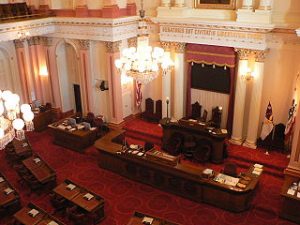 The Assembly is now considering a bill passed by the Senate to further restrict gifts to lawmakers. Senate Bill 1443 prohibits all gifts from lobbyists and reduces the value of gifts state officials can receive from a non-lobbyist source to $200 per calendar year. Currently, lobbyists may provide gifts of $10 per calendar month and officials can receive $440 from a non-lobbyist source per calendar year.
The Assembly is now considering a bill passed by the Senate to further restrict gifts to lawmakers. Senate Bill 1443 prohibits all gifts from lobbyists and reduces the value of gifts state officials can receive from a non-lobbyist source to $200 per calendar year. Currently, lobbyists may provide gifts of $10 per calendar month and officials can receive $440 from a non-lobbyist source per calendar year.
The bill also prohibits most recreational tickets to concerts, professional sporting events, and amusement parks.
Photo of the California Senate chamber by David Monniaux on Wikimedia Commons.
April 23, 2014 •
Ohio Lawmakers to Introduce Ethics Reform Legislation
Ohio lawmakers plan to introduce legislation next month making significant changes to state ethics rules for the first time in decades. The bill would double the amount lobbyists can spend on gifts to lawmakers but require lobbyists and public officials […]
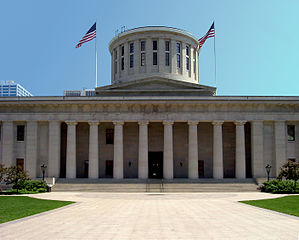
Ohio lawmakers plan to introduce legislation next month making significant changes to state ethics rules for the first time in decades. The bill would double the amount lobbyists can spend on gifts to lawmakers but require lobbyists and public officials to report when a lobbyist spends more than $100 per year on an official for meals, entertainment, transportation, or other gifts.
State Sen. Larry Obhof, a Republican co-sponsor of the bill, maintains a higher reporting threshold is necessary to keep lobbyists honest, as many lobbyists seek to find ways to avoid the lower threshold.
Other notable legislative provisions raise the lobbyist registration fee from $25 to $35, strengthen whistle-blower protection guidelines, allow lawmakers to remedy reporting errors, require random audits of financial disclosure statements, and make changes to procedures for ethics investigations. Bill sponsors argue the bill is intended to increase transparency and accountability.
Photo of the Ohio State Capitol courtesy of Alexander Smith on Wikimedia Commons.
February 25, 2014 •
Philadelphia Gift Ordinance Advances Out of Committee
A proposed ordinance setting a dollar limit for gifts has advanced out of committee. On February 24, the City Council’s Committee on Law and Government voted to submit the bill for Council action. The proposed ordinance prohibits gifts exceeding $99 […]
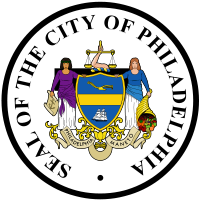
A proposed ordinance setting a dollar limit for gifts has advanced out of committee. On February 24, the City Council’s Committee on Law and Government voted to submit the bill for Council action.
The proposed ordinance prohibits gifts exceeding $99 per calendar year to any city officials or employees, and bans all cash gifts.
The ordinance could pass as early as next week.
January 13, 2014 •
Virginia Governor Establishes Gift Rules for Executive Branch Employees
Terry McAuliffe was sworn in as Governor of Virginia this weekend, and already he is making ethics a priority for his administration. Executive Order 2 establishes a gift limit for all executive branch officials and employees, prohibiting acceptance of gifts […]
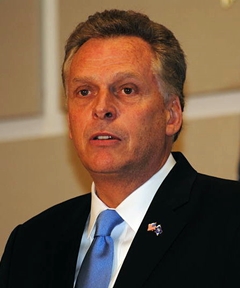
Terry McAuliffe was sworn in as Governor of Virginia this weekend, and already he is making ethics a priority for his administration. Executive Order 2 establishes a gift limit for all executive branch officials and employees, prohibiting acceptance of gifts exceeding $100 per calendar year. Gifts from lobbyists and principals are restricted to $25.
The order does allow for some exceptions, such as excluding items of $25 or less from the definition of gift, and allowing for receipt of certain items while engaging in an activity serving a legitimate public purpose, such as food and refreshments served at certain events.
These restrictions became effective upon his signature on January 11, 2014.
The full text of Executive Order 2 can be viewed here.
Photo of Gov. Terry McAuliffe by Edward Kimmel on Wikimedia Commons.
May 31, 2013 •
Kansas City, Missouri Council Passes Ethics Ordinance
Gifts capped at $1,000
 City Council approved changes to the ethics code setting limits on gifts to city officials and employees on Thursday, May 30, 2013. Ordinance No. 130249 prohibits an official or employee and their immediate families from knowingly accepting any gift having a value in excess of $1,000 from any person or business with a substantial interest in legislative or administrative actions.
City Council approved changes to the ethics code setting limits on gifts to city officials and employees on Thursday, May 30, 2013. Ordinance No. 130249 prohibits an official or employee and their immediate families from knowingly accepting any gift having a value in excess of $1,000 from any person or business with a substantial interest in legislative or administrative actions.
Gifts worth more than $200 must be reported quarterly by the city official or employee. Previously, reports were due annually and there was no limit on gifts.
The bill becomes effective in 10 days unless vetoed by the Mayor.
House Bill 142 and House Bill 143 become new ethics law
 Governor Nathan Deal signed two pieces of ethics legislation aimed at increasing public confidence in state government on May 6, 2013. House Bill 142 restores rulemaking powers to the Georgia Government Transparency and Campaign Finance Commission, clarifies and modifies classification as a lobbyist, and sets a gift limit of $75 per lobbyist gift.
Governor Nathan Deal signed two pieces of ethics legislation aimed at increasing public confidence in state government on May 6, 2013. House Bill 142 restores rulemaking powers to the Georgia Government Transparency and Campaign Finance Commission, clarifies and modifies classification as a lobbyist, and sets a gift limit of $75 per lobbyist gift.
House Bill 143 requires more campaign transparency for local races and allows for public notice of any campaign contributions given to members of the General Assembly leading up to the start of the legislative session. The bills become effective January 1, 2014.
State and Federal Communications, Inc. provides research and consulting services for government relations professionals on lobbying laws, procurement lobbying laws, political contribution laws in the United States and Canada. Learn more by visiting stateandfed.com.

